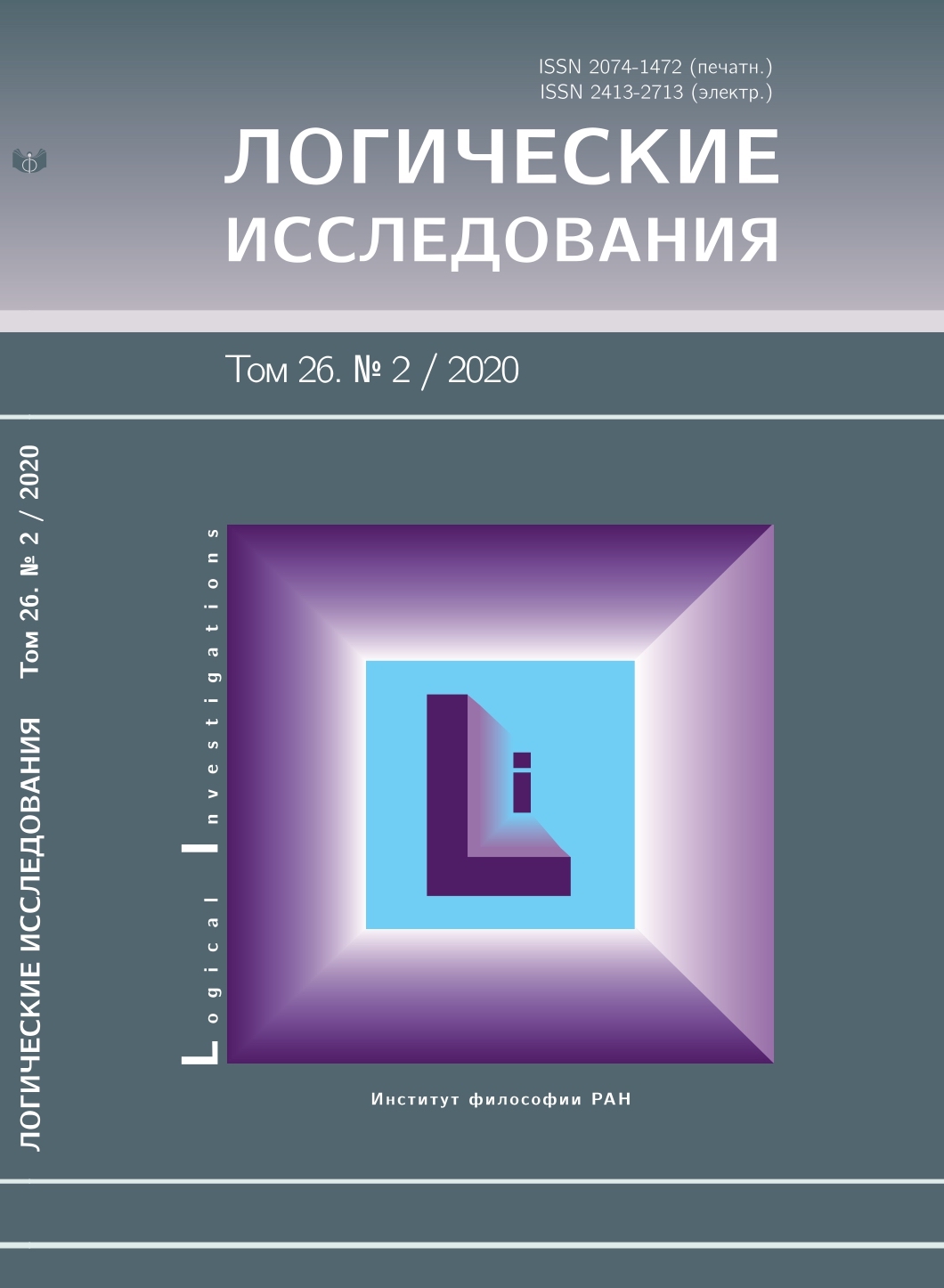Logical aliens and where to find them
##plugins.themes.bootstrap3.article.main##
Abstract
This paper is concerned with Frege’s logical aliens argument against psychologism in logic. The paper argues that this argument becomes too radical in the context of current philosophy in logic. The possible answer to Frege’s argument could be inspirited by the philosophical ideas of later Wittgenstein: we play different language games, and some of them are logical games. However, different people have different criteria of certainty and not all of them can play logical games. This gives new comprehension of the normativity of logic that shows that there are no logical aliens in absolute sense. This view can give in turn a new understanding of what rationality is and show why logic and psychology should interact.
##plugins.generic.usageStats.downloads##
##plugins.themes.bootstrap3.article.details##
Copyright (c) 2020 Гала Валерьевна Максудова-Елисеева

This work is licensed under a Creative Commons Attribution-NonCommercial 4.0 International License.
References
Bryushinkin, V. (1988) Logic, thought, information. Saint Petersburg: Izdatelstvo Leningradskogo universiteta. (in Russian)
Bryushinkin, V. (1998) Psychologism around the turn of the millennium.
Byrne, R. (1989) Suppressing valid inferences with conditionals. Cognition, 31, 61–83.
Conant, J. (1991) In Search of Logical Alien Thought – Descartes, Kant, Frege and the Tractatus. Philosophical Topics, 20(1), 115-180.
Dragalina-Chernaya, E. (2015) Nonformal notes on the logical form. Saint Petersburg: Aletheia. (in Russian)
Dutilh Novaes, C. (2013) A Dialogical Account of Deductive Reasoning as a Case Study for how Culture Shapes Cognition. Journal of Cognition and Culture, 13, 459-482.
Dutilh Novaes, C. (2015) A Dialogical, multi-agent account of the normativity of logic. Dialectica. 69(4), 587-609.
Frege, G. (1893) Grundgesetze der Arithmetik. Bd. 1. Begriffsschriftlich abgeleitet. Jena: Verlag Hermann Pohle.
Greiffenhagen, C. & Sharrock, W. (2006) Logical relativism: logic, grammar, and arithmetic in cultural comparison. Configurations, 14, 275-301.
Haack, S. (1978) Philosophy of logics. Cambridge: Cambridge University Press.
Hanna, R. (2006) Rationality and logic. Cambridge, MA: The MIT Press.
Harman, G. (2002) Internal Critique: A Logic is not a Theory of Reasoning and a Theory of Reasoning is not a Logic. In D. M. Gabbay, R. H. Johnson, H. J. Ohlbach & J. Woods (Eds.), Handbook of the Logic of Argument and Inference: The Turn Towards the Practical (171-186). Amsterdam: Elsevier Science B.V.
Łukasiewicz, J. (1951) Aristotle's Syllogistic From the Standpoint of Modern Formal Logic. Oxford: Oxford University Press.
Linnebo, O. (2003) Frege’s conception of logic: from Kant to Grundgesetze. Manuscrito, 26(2), 235-252.
Luria, A. (1976) The Cognitive Development: Its Cultural and Social Foundations. Harvard University Press.
Patterson, G. (2019, January 13) Fighting cybercrime with neurodiversity. Project Syndicate. Retrieved from https://www.project-syndicate.org/
Shapiro, S. (2014) Varieties of Logic. Oxford: Oxford University Press.
Shramko, Y. (2014) The logical way of being true: Truth values and the ontological foundation of logic.
Shramko, Y. (2018) Logical way of truth being. In D. Zaytsev (ed.), Sovremennaya logika: osnovaniya, predmet i perspektivyi razvitiya (96-110). Moskva: Forum. (in Russian)
Read, S. (2006) Monism: The one true logic. In D. DeVidi & T. Kenyon (Eds.), A Logical Approach to Philosophy: Essays in honour of Graham Solomon (193-209). Berlin: Springer.
Stenning, K. & van Lambalgen, M. (2007a) Human reasoning and cognitive science. Cambridge, MA: MIT University Press.
Stenning, K & van Lambalgen, M. (2007b) Logic in the study of psychiatric disorders: Executive function and rule-following. Topoi, 26, 97-114.
Van Benthem, J. (2008) Logic and reasoning: do facts matter? Studia Logica, 88(1), 61-84.
Vasyukov, V. (2015) Horizons of logical pluralism.
Vygotsky, L. (1956) Narushenie ponyatiy pri shizofrenii. In L. Vygotsky, Izbrannyie psihologicheskie proizvedeniya (481-496). Moskva: izdatelstvo akademii pedagogicheskih nauk RSFSR.
Wason, P. (1966) Reasoning about a rule. Quarterly Journal of Experimental Psychology, 20, 273–281.
Wittgenstein, L. (1953) Philosophische Untersuchungen. Oxford, Basil Blackwel.
Wittgenstein, L. (1970) Über Gewißheit. Frankfurt: Suhrkamp Verlag. (Original work published 1869)
Zaytsev, D. (2018) Logic, reasonings, information. In D. Zaytsev (ed.), Sovremennaya logika: osnovaniya, predmet i perspektivyi razvitiya (111-127). Moskva: Forum. (in Russian)
Zeigarnik, B. (1976) Patopsihologiya. Moskva: Izdatelstvo Moskovskogo universiteta.
